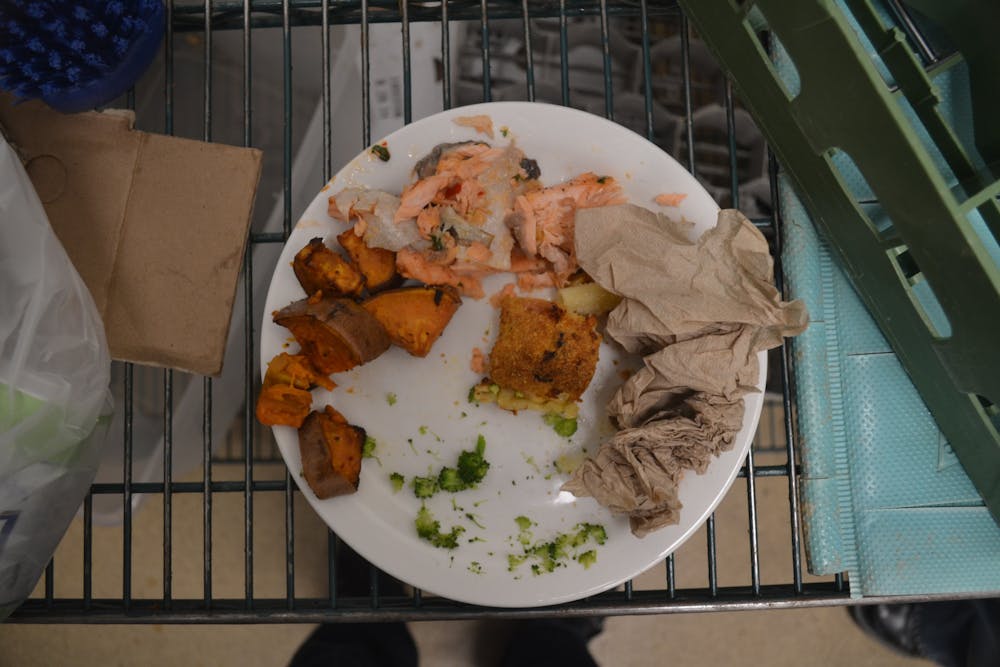Welcome to Talking Trash, a new series uncovering the hidden journey of post-consumer waste at Middlebury. From food scraps and compost to recyclables and landfill-bound trash, we’ll trace the path of discarded waste after it leaves the hands of our community, revealing the impact of our waste habits and the systems managing them.
At lunch, Middlebury’s dining halls buzz with activity as students hurriedly stop by for a quick bite before dashing off to their next commitment. Thursday, Sept. 19 was no exception. A group of Environmental Studies senior practicum students rushed through their meals after class ended at 12:15 p.m. to make it to the Howard Woodin Colloquium by 12:40 p.m. Among them was Professor of Economics and Environmental Studies Jon Isham, who, around 12:36 p.m., had not finished the green beans that lay on his plate.
“And now, I’m going to do something I don’t normally like to do," Isham said, and proceeded to take his plate of unfinished food to the dish carousel, sending it to the abyss.
As an infrequent patron of Middlebury dining halls and a scholar of environmental economics, Isham was understandably disturbed by the idea of wasting food. Yet anyone who routinely dines in any of the college’s three dining halls knows that clean plates on the dish carousel are a rarity.
“I’ve never had a clean plate at Middlebury,” Tulip Larson ’25 said over a plate of unfinished grapefruit slices a few weeks later in Proctor. “There’s always something I get that I don’t like, or can’t finish.”

On any given day, dining hall visitors waste the equivalent of hundreds of meals, making Isham’s green beans and Larson’s grapefruit peels merely a drop in the bucket. According to Dining Services Manager Brent Simons, the most recent “Weigh the Waste” report, which Dining Services calculates in partnership with students, found that on April 22, 2022, students in Ross Dining Hall generated 354.2 pounds of food waste. For context, the average person eats about three pounds of food a day.
Numbers like these corroborate the quantities of waste that dining hall staff witness each day. Although no new report has been conducted on food waste specifically, Executive Director of Food Service Operations Dan Detora told The Campus that he has not noticed any increases or decreases in the college’s food waste over the past decade.
For Detora and Simons, food waste is not only financially inconvenient, it is personally upsetting.
“Obviously we expect some food waste. However, when you see and hear food banks and food shelves literally begging for donations it is quite troubling. In addition, just the effort put forth by our employees on a daily basis and then to see it discarded [is troubling],” Simons wrote in an email to The Campus.
For Detora and Simons, the lack of control over post-consumer waste worries them the most. Though Dining Services can take steps to reduce pre-consumer waste like being more mindful of expiration dates and using special cutting techniques to minimize scraps, student habits are harder to change.
“The biggest concern for me is the student waste because I really have no control over it. Overproduction from my staff can be easily adjusted, but I can’t control how much a student takes from the food line and then wastes it,” Detora wrote in an email to The Campus.
Middlebury students’ tendencies to waste food reflect broader trends — the world throws away about a third of its food, which is the equivalent of 1.3 billion tons or 1 trillion U.S. dollars. The impact of that waste on the environment and our climate is significant; in the U.S. alone, food waste accounts for about six to eight percent of all carbon emissions, or the equivalent of 32.6 million cars.
At Middlebury, almost all food waste is composted. In the dish room, a food pulper churns and grinds the leftovers, which dining hall staff dump in one of several bins outside the dining halls. Each day, members of the Facilities Services team drive to each of the dining halls to pick up the waste and take it to the compost site between the golf course and South Street.
The “stump dump,” as Kim Bickham and Doug Smith of Facilities Services call it, is a paved area that holds several piles for different stages of the compost cycle. The remnants of food, utensils and the occasional beer can in the piles serve as a direct reflection of Middlebury students’ consumption habits. Although Facilities do their best to sort out non-compostable waste before it enters the compost pile, Smith described that contamination is an inevitable part of the process.
Middlebury’s compost weighed in at 608,096 pounds for the entire year of 2023, which comprised 26.2% of Middlebury’s total waste, according to Bickham. The compost during the months of May, June and December, when students are on breaks, yielded the least compost — May’s waste weighed 30,360 pounds, less than half of that of June, which weighed 64,928 pounds, suggesting that student food waste in dining halls and dorms comprises the bulk of the compost site’s weight.
Composting is a practical activity for the hundreds of thousands of pounds of food waste that Middlebury generates; all of the college’s compost is used on-site by the grounds team, according to Bickham and Smith. Although composting is less environmentally harmful than the alternative of leaving food to rot in landfills, it still releases enormous amounts of methane, a gas that decreases air quality and contributes to environmental degradation in several other ways. On a systemic level, composting cements overconsumption as part of the food supply chain and fails to address the problem at its root, which, according to Professor of Food Studies Molly Anderson, is overproduction and overconsumption of food on all scales.
“A big part of it is that the United States encourages overproduction. We have a really big problem with overproduction of most crops, and there are all sorts of incentives for farms to get bigger and to be producing more and for the productivity on farms to go up,” Anderson said in an interview with The Campus.
On a local scale, Anderson said that Middlebury students seem to have internalized an abundance mindset, which is often the reason they over-serve themselves.
“A lot of students at Middlebury have grown up with plenty of food, and they never thought about food being scarce. They don't have a good sense of the value of food, and how precious it really is. So if they take extra food and end up throwing out half of it, it just doesn't hit them that this is an incredible waste,’” Anderson said.
Dining halls are a unique environment because restrictions and incentives for limiting waste that some other countries implement –– for instance, South Korea charging citizens for food waste by weight or parents offering dessert as a reward for a clean plate –– are not possible. While broader shifts to our food system may eventually minimize food waste as a part of our culture, immediate shifts on a college level hinge on individual responsibility. Thus the answer to this collective action problem begins with recognition of waste and a mindfulness of personal contributions to a broader problem, according to Anderson.
Instead of emphasizing the evils of wasting food, Anderson said that awareness should be built around the value of food as a resource, and the importance of conserving it, for environmental, social and economic reasons.
Editor’s Note: Tulip Larson ’25 is an Arts & Culture Editor for The Campus.

Maggie Bryan '25 (she/her) is the Senior News Editor.
Maggie is a senior at Middlebury, majoring in Environmental Policy and French. She previously held roles as Senior Arts and Culture Editor, Arts and Culture Editor, and Staff. During her free time, she loves running, listening to live music, drinking coffee, and teaching spin classes. She is from Chapel Hill, North Carolina.




